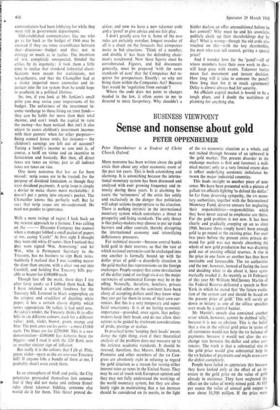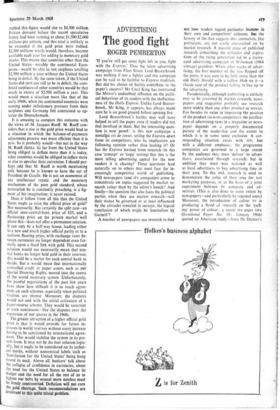Sense and nonsense about gold
BUSINESS VIEWPOINT PETER OPPENHEIMER
Peter Oppenheimer is a Student of Christ Church, Oxford.
More nonsense has been written about the gold crisis than about any other economic event of the past ten years. This is both astonishing and alarming. It is astonishing because the interna- tional monetary system has been discussed and analysed with ever growing frequency and in- tensity during these years. It is alarming be- cause the 'seriousness' of the crisis lies solely and exclusively in the. danger that politicians will adopt actions inappropriate to the situation. There is nothing intrinsic in the international monetary system which constitutes a threat to prosperity and living standards. The only threat is that policy-makers may choose to put up trade barriers and other controls, thereby disrupting the international economy and intensifying deflationary pressures.
For technical reasons—because central banks hold gold in their reserves, so that the rate at which national currencies can be exchanged into one another is formally bound up with the dollar price of gold—a disorderly situation in the gold market has repercussions on the foreign exchanges. People suspect that some devaluation of the dollar (and of sterling) vis-a-vis the major currencies of continental Europe may be in the offing. Naturally, therefore, hoteliers, private bankers and others on the continent have been chary of accepting dollars until they know what they can get for them in terms of their own cur- rencies. But this is a very temporary and super- ficial uncertainty. It is of no lasting economic importance—provided, once again, that policy- makers keep their heads and do not allow their actions to be guided by irrelevant considerations of pride, prestige or malice.
In practical terms 'keeping their heads' means doing the right thing, even if their theoretical analysis of the problem does not measure up to the strictest academic standards. It should be stressed, therefore, that Messrs. Mills, Patman, Proxmire and other members of the us Con- gress are absolutely right in refusing to regard the gold situation as a reason for raising either interest rates or taxes in the United States. They may be out of touch with European opinion and they may not fully understand the workings of the world monetary system, but they are abso- lutely right in maintaining that a tax increase should be considered on its merits, in the light of the us economic situation as a whole, and not rushed through because of an upheaval ih the gold market.- The present disorder in the exchange markets is first and foremost a tech- nical matter; only to a very limited extent does it reflect underlying economic imbalance be- tween the major industrial countries.
This leads straight to another piece of non- sense. We have been presented with a picture of gallant us officials fighting 'to defend the dollar.' So far from deserving sympathy, the us mone- tary authorities, together with the International Monetary Fund, deserve censure for neglecting their responsibilities—responsibilities which they have never ceased to emphasise are theirs. For the gold problem is not new. It has been clearly and gradually creeping up on us since 1960, because there simply hasn't been enough gold to go round at the existing price. For ovei two years before the present crisis private de7 mand for gold was not merely absorbing the whole of new gold production but was draining gold out of existing official reserves. A rise in the price in one form or another has thus been inevitable and foreseeable. The us authorities and the IMF, however, instead of facing the issue and deciding what to do about it, have syste- matically evaded it. As recently as 14 February of this year Mr William McChesney Martin of the Federal Reserve delivered a speech in New York in which he stated that 'the future evolu- tion of the system can and should be based on the present price of gold.' This will surely go down in history as one of the silliest speeches ever made by a central banker.
Mr Martin's speech also contained another error which, however, cannot be dubbed 'silly,' because it is not so obvious. This is the belief that a rise in the official gold price in terms of all currencies would not help the us balance of payments, because it would not alter the ex- change rate between the dollar and other cur- rencies. The truth is that a substantial rise in the gold price would give substantial help to the us balance of payments and might even cure the deficit completely.
People have failed to appreciate this because they have looked only at the effect of an in- crease in the gold price on the value of gold already in existence. _They have neglected the effect on the value of newly mined gold. At $35 per ounce the value of annual gold output is now about $1,500 mi1lio. If the Price were trebled this figure would rise to S4,500 million. Private demand before the recent speculative frenzy had been running at about $1,500-$2,000 millions per annum, and this total is unlikely to be exceeded if the gold price were trebled.
$2,500 millions worth would, therefore, become available each year for adding to monetary gold stocks. This means that countries other than the United States—notably the continental Euro- peans—would be able to run surpluses totalling $2,500 million a year without the United States being in deficit. By the same token, if the United
States did turn out still to be in deficit, the com- bined surpluses of other countries would be that
much in excess of $2,500 million a year. This would mean a situation more like that of the early 1960s, when the continental countries were coming under inflationary pressure from their surpluses and Germany felt contrained to up- value the Deutschemark.
It is amusing to compare this outcome with the views of M. Jacques Rueff. M. Rueff con- siders that a rise in the gold price would lead to a situation in which the balance-of-payments adjustment process was more efficient than it is now. So it probably would—but not in the way M. Rueff thinks. So far from the United States being obliged to deflate more than it is today,
other countries would.be obliged to inflate more or else to upvalue their currencies. I should per- haps add that M. Rueff is worth mentioning
only because he is 'known to have the ear of President de Gaulle. He is not an economist of any intellectual repute. and the monetary mechanism of the pure gold standard, whose restoration he is constantly preaching, is a fig- ment of his imagination; it never existed.
, Does it follow from all this that the United States ought to raise, the official price of gold? Not necessarily. But certainly the split rate—an 'official inter-central-bank price of $35, and a fluctuating price an the private market well above this--:does not offer a permanent solution.
It can only, be a halfway house, leading either to a new and much higher official parity or to a
uniform floating price. with exchange rates be- tween currencies no Fonger dependent even for- mally upon a fixed link with gold. This second
solution would not necessarily mean that cen-
tral banks no longer held gold in their reserves; this would be a matter for each central bank to decide. But it would mean that internationally controlled credit or paper assets, such as nor Special Drawing Rights, moved into the centre of the world monetary system. Unfortunately, the painful negotiations of the past few years have show how difficult it is to reach agree- ment on such schemes, especially when political rivalries are intense Moreover, the disputes would not end with the initial activation of a paper-reserve scheme. They would be recurrent or even continuous—like the disputes over the expansion of 54F quotas in the 1960s.
The greater attraction of a higher official gold price is that it would provide for future in- creases in world reserves without every increase having to be sanctioned by international agree- ment. This would stabilise the system in its pre- sent form. It may not be the best solution logic- ally, but it ought to be considered on its techni- cal merits, without nonsensical labels such as humiliation for the United States' being hung round its neck. Above all, bankers' talk about the collapse of confidence in currencies, about the need for the United States to balance its budget and the need for all the rest of us to tighten our belts by several more notches must be firmly controverted. Deflation will not cure the gold shortage. Such- recommendations are irrelevant to this quite trivial problem.







































 Previous page
Previous page